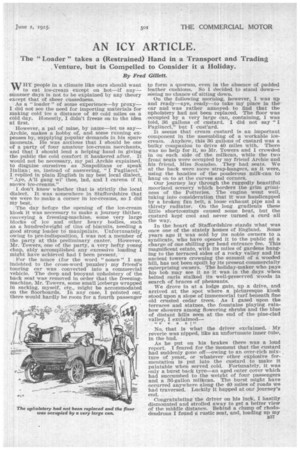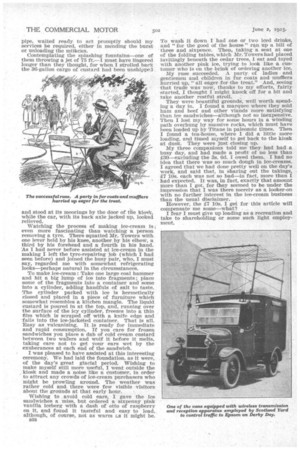AN ICY ARTICLE.
Page 21

Page 22

If you've noticed an error in this article please click here to report it so we can fix it.
The " Loader " takes a (Restrained) Hand in a Transport and Trading Venture, but is Compelled to Consider it a Holiday.
By Fred Gillett.
WHY people in a climate like ours should want to eat ice-cream except on hot—if any— summer days is not to be -explained by any theory except that of sheer cussedness.
As a " loader " of some experience—by proxy— I did not see the need for importing materials for making cold ice a distance of 40 cold miles on a cold day. Honestly, I didn't freeze on to the idea at first.
However, a pal of mine, by name—let us say— 'Archie, makes a hobby of, and seine running expenses by, supplying popular demands in his spare moments. He was anxious that I should be one of a party of four amateur ice-cream merchants, and that I should lend a helping hand in giving the public the cold comfort it hankered after. It would not be necessary, my pal Archie explained, to disguise ourselves as Neapolitans or speak Italian ; so, instead of answering, "I Pagliacci," I replied in plain English in my best local dialect, "Aye, All gang wi' thee, lad, and I carena if it snows ice-creams."
I don't know whether that is strictly the local dialect. It was somewhere in Staffordshire that we were to make a corner in ice-creams, so I did my best.
The day before the opening of the ice-cream kiosk it was necessary to make a journey thither, conveying a freezing-machine, some very large blocks of ice and other heavy bodies,. such as a hundredweight of tins of biscuits, needing a good strong loader to manipulate. Unfortunately, owing to pre-indisposition, I was not a member of the party at this preliminary canter. However, Mr. Towers, one of the party, a very hefty young chap, ably accomplished any excessive loading I might have achieved had I been present.
For the nonce (for the word " nonce " I am indebted to the cross-word puzzler) my friend's touring car was converted into a commercial vehicle. The deep and buoyant upholstery of the back seat was removed in order that the freezingmachine, Mr. Towers, some small icebergs wrapped in sacking, myself, etc., might be accommodated on the floorboards. In any case, I pointed out, there would hardly be room for a fourth passenger to form a quorum, even in the absence of padded leather cushions. So I decided to stand down— seeing no chance of sitting down.
On the following morning, however, I was up and ready—aye, ready—to take my place in the' car and was rather annoyed to find that the upholstery had not been replaced. The floor was occupied by a very large can, containing, I was told, 36 gallons of custard. I did not say "I Pagliacci," but I cust'ard.
It seems that cream custard is an important component in the assembling of a workable icecream. Anyhow, this 36 gallons of custard was a bulky companion to drive 40 miles with. There was no help for it, so Mr. Towers and I crowded in on each side of the nailkcan, while the two front seats were occupied by my friend Archie and his friend, Miss Soandso. They had seats. We at the back were mere strap-hangers, as it were, using the handles of the ponderous milk-can to hang on to at the curves and corners.
Our journey lay through the ruggedly beautiful moorland scenery which borders the grim griminess of the Potteries. The engine went well, taking into consideration that it was handicapped by a broken fan belt, a loose exhaust pipe and a thirsty radiator. On the long gradients these little shortcomings caused some heat, but the custard kept cool and never turned a curd all the way.
In the heart of Staffordshire stands what was once one of the stately homes of England. Some years ago it was sold by its noble owners to a syndicate, who have opened it to the public at a charge of one shilling per head entrance fee. This magnificent estate, with its miles of gardens hanging to the terraced sides of a rocky valley and its ancient towers crowning the summit of a wooded hill, has not been spoilt by its present commercially enterprising owners. The holiday-maker who pays his bob may see it as it was in the days when belted earls stalked its well-preserved woods in search of braces of pheasants.
We drove in at a lodge gate, up a drive, and arrived at the spot where a picturesque kiosk stood upon a slope of immemorial turf beneath fine old crusted cedar trees. As I gazed upon the terraces and statues, the fountains playing rainbow showers among flowering shrubs and the blue of distant hills seen at the end of the pine-clad valley, I exclaimed* No, that is what the driver exclaimed. My reverie was nipped, like an unfortunate inner tube, in the bud.
As he put on his brakes there was a loud report. I feared for the moment that the custard had suddenly gone off—owing to an over-rich mixture of yeast, or whatever other explosive fermentation is put into the custard to make it palatable when served cold. Fortunately, it was only a burst back tyre—an aged outer cover which had succumbed to the weight of four passengers and a 36-gallon milkcan. The burst might have occurred anywhere along the 40 miles of roads we had traversed. Luckily it happed at our journey's end. • Congratulating the driver on his luck-, I hastily dismounted and strolled away to get a better view of the middle distance. Behind a clump of rhododendrons I found a rustic seat, and, loading up my
pipe, waited ready to act promptly should my services be required, either in mending the burst or unloading the milkcan.
Contemplating the splashing fountains—one of them thriawing a jet of 75 ft.—I must have lingered longer than they thought, for when I strolled back the 36-gallon cargo of custard had been unshipped and stood at its moorings by the door of the kiosk, while the car, with its back axle jacked up, looked relieved.
Watching the process of making ice-cream is even more fascinating than watching a person removing a tyre. There squatted Mr. Towers with one lever held by his knee, another by his elbow, a third by his forehead and a fourth in his hand. As I had never before assisted at ice-cream in the making I left the tyre-repairing job (which I had seen before) and joined the busy pair, who, I must say, regarded me with somewhat refrigerating looks—perhaps natural in the circumstances.
To make ice-cream : Take one large coal hammer and hit a big lump of ice into fragments ; place some of the fragments into a container and some into a cylinder, adding handfuls of salt to taste. The cylinder packed with ice is hermetically closed and placed in a piece of furniture which somewhat resembles a kitchen mangle. The liquid custard is poured in at the top, and, running over the surface of the icy cylinder, freezes Into a thin Man which is scraped off with a knife edge and falls into the ice-jacketed container. That is all. Easy as vulcanizing. It is ready for immediate and rapid consumption. If you care for frozen sandwiches you place a dab of cold cream custard between two wafers and -wolf it before it melts, taking care not to get your ears wet by the exuberances at each end of the sandwich.
I was pleased to have assisted at this interesting ceremony. We had laid the foundation, as it were, of the day's great glacial period. Wishing to make myself still more useful, I went outside the kiosk and made a noise like a customer. in order to attract any crowds of ice-cream purchasers who might be prowling around. The weather was rather cold and there were few visible visitors about the grounds at that early hour.
Wishing to avoid cold ears, I gave the Ice sandwiches a miss, but ordered a sixpenny pink vanilla iceberg with a dash of otto of raspberry on it, and found it tasteful and easy to load, although, of course, not as warm as it might be. To wash it clown I had one or two iced drinks, and "for the good of the house" ran up a bill of three and sixpence. Then, taking a seat at one of the folding tables, which Mr. Towers had placed invitingly beneath the cedar trees, I sat and toyed with another pink ice, trying to look like a customer who is on the brink of ordering another ice.
My ruse succeeded. A party of ladies and gentlemen and children in fur coats and mufflers hurried up, "all eager for the treat." And, seeing that trade was now, thanks to my efforts, fairly started, I thought I might knock off for a bit and take another restful stroll. : They were beautiful grounds, well worth spending a day in. I found a marquee where they sold ham and beef and other viands more satisfying than ice sandwiches—although not so inexpensive. Then I lost my way for some hours in a winding path overhung by massive rocks, which must have been loaded up by Titans in paleozoic times. Then I found a tea-house, where I did a little more loading, and timed myself to get back to the kiosk at dusk. They were just closing up.
My three companions told me they had had a busy day, and had made a profit of no less than
£30 excluding the 3s. 6d. I owed them. I had no idea that there was so much dough in ice-creams. I agreed that we had done pretty well on the day's work, and said that, in sharing out the takings, £7 10s. each was not so bad—in fact, more than I had expected. It was, in fact, exactly that amount more than I got, for they seemed to be under the impression that I was there merely as a looker-on with no further interest in the ice-cream business than the usual disclaimer.
However, the £7 10s. I get for this article will compensate me some—what? .
I fear I must give up loading as a recreation and take to shareholding or some such light employment.




























